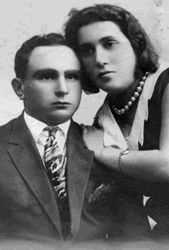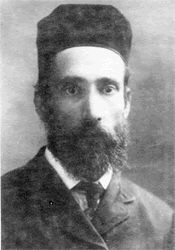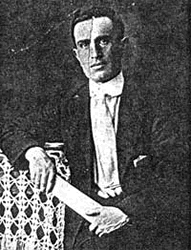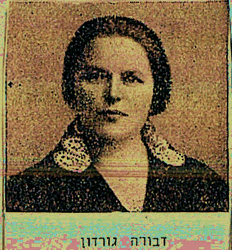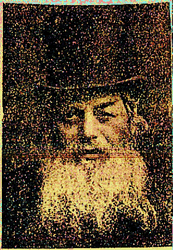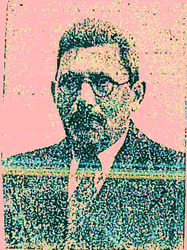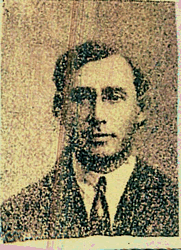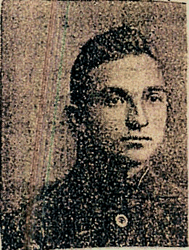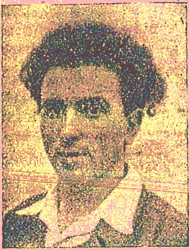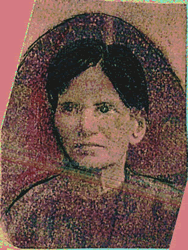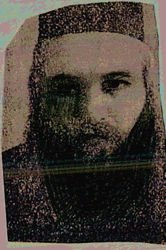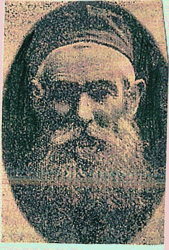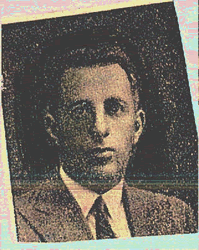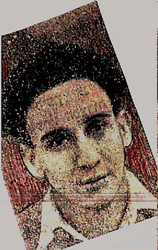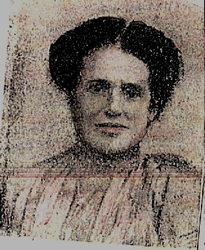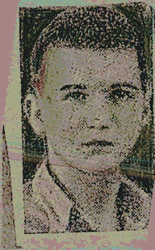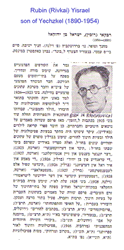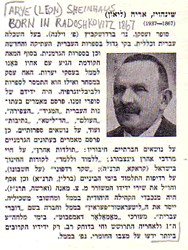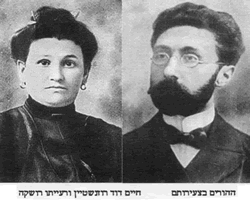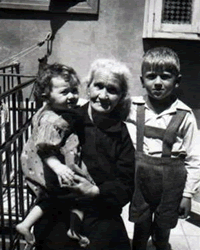#rp-2:
Man̩ and Surroundings
M. Z. Man̩ was the star who put our town on the map, and some of his glory reflected back on the town. His many talents as a poet and a painter, which did not come to full fruition, must have been absorbed from the natural environment in which he grew up. His calm and even temper must have been shaped by the tranquil, green surrounding of Radoshkowitz and its pleasant, friendly residents.
Mordecai Zvi grew up in poverty. His family lived in a small apartment near the market, on a side street which led to the fields. The father taught in heder, where his son was one of his pupils. His teaching income was not enough to sustain the family. The mother, Tamara, an energetic woman, sold ceramic containers at the market, and the father engraved tombstones. He would bring the stone slabs home, and his son, surrounded with the gloom of the dead, would yearn for the colors of the sun and the open fields. The time M. Z. spent in nature must have been very limited because he does not mention it in his poems. Some say that a fire destroyed their apartment house, and the family had to leave and ask for financial aid from some rich relatives. When M. Z. reached the age of thirteen, in order to keep expenses down and acquire some spiritual gains, his parents sent him to a yeshiva in Minsk. He spent a few miserable years there, which he mentioned later in his writing. When he returned home, disappointed, his parents began looking for a way for him to make a living. He had a most beautiful handwriting, and so he went to the scribe, Zvi, and his son, Avraham Shachor, to learn their trade. This opened new paths for this most talented young man. Zvi and Avraham Shachor were learned and progressive men, and they recognized the outstanding talents of M. Z. Man̩. They became a guiding light and spiritual support for him during his short life. They encouraged him to get a broad, general education and develop his special talents. They were happy with his accomplishments and were his true friends.
When Avraham realized that Man̩ had a talent for painting, he advised him to go to Vilna to study. Man̩ spent four years there, where he was aided by some generous people who supported him. He studied Hebrew and poetry and finished with distinction at a school for painting. He returned to Radoshkowitz at age twenty-one, an accomplished young man on his way up. He spent a short time there, but stood out from the young people of his generation as a very special, creative young man.
Zvi and Avraham Shachor were delighted with Man̩'s first successes. He painted both their portraits, which were hung in their room. At this time, another home opened to Man̩, the house of wealthy wood merchant, Haim Yoel Shinhaus. He and his two sons Bendet and Leon spent most of their time away on business, returning to Radoshkowitz for the holidays. The younger son, Leon, was well educated and fluent in Hebrew and German literature and used to publish articles in the two languages. He befriended Man̩. He admired his talents and his gentle ways and became his closest friend. After Man̩'s death, it was Leon who had his works published by Tushia.
Another admirer of Man̩'s was the Hebrew teacher, Ya'acov Orchiks: tall, bespectacled and a with a hoarse voice. Like a professional teacher, he added the vowels to Man̩s poems. Other aspiring poets who admired Man̩ were Itzchak Yoel Rubin and Haim David Rosenstein, who later became famous for their publications and educational activities. These were Man̩'s friends. They accompanied him on his walks out of town, discussing art and literature with him. Man̩ spoke a great deal about the writers and artists who had impressed him in Vilna. When he left for St. Petersburg to continue his studies at the Academy of Art, each of his friends went his own way but still followed the impressive accomplishments of their mutual friend, Man̩.
Three years later Man̩ returned to Radoshkowitz for the summer, to rest. During his three years away he had seen the big world, the big city. He had seen many art treasures and made great strides in general studies and in professional knowledge. He had established some sources of income, met some important Jewish (Hebrew) poets ��� Y. L. Gordon, the Baron Ginsburg, Kaufman and more. The highest authorities now recognized him as an artist and poet with a promising future. On this visit to Radoshkowitz he was received as a celebrity, not only by his friends, but by the whole town. He was special, a phenomenon, a climbing star, whose light shone on us all. That summer he enjoyed the love and admiration of the whole town.
The same summer Man̩ went to Warsaw and stayed with one of his Vilna friends, the singer and cantor, Shmuel Tsiz. He also came to know the writers and journalists, Nachum Sokolov and Shaul Pinchas Rabinovitz. The former published a yearly called, "Ha'assif," and the latter, the yearly, "Knesset Yisrael." Man̩ illustrated them with his drawings and published some articles. A year later, Man̩ returned to Radoshkowitz to rest again. He was at the height of fame as an artist and poet, with a promising future, but was already touched by the disease which would kill him. The winter before, he had caught a cold in the frigid, damp winter of St. Petersburg and came down with tuberculosis. His body was weak from hard work and poor nutrition, and the disease never left him. He was unable to continue with his studies and so remained in Radoshkowitz. His last two years were spent in idleness and boredom, physical and mental torment and diminishing strength.
And so, Radoshkowitz saw its favorite son slowly dying. The circle of friends around him grew. He wanted to establish a small library for the books of the Haskalah. He also tried to publish with his friends, Shinhaus and Rubin, a monthly called, "Hanitzanim," ("The Buds"), for the readers in town. The first issue was published after his death. Man̩ passed away during the holiday of Succoth. His tombstone in the old cemetery tells future generations of the light that was extinguished before its time.
#rp-5:
Sam (Shimon Nachum) Hochstein (b. 1888 Radishkovitch, Vilna Province near Minsk, migrated to US circa 1905, d. 1964, New York, New York) Son of Yosef "Yoshe" Hochstein and Rashe Gitte (Issacson) Hochstein.
#rp-6:
When Radoshkowitz was cut off from Minsk (as a result of the new borders in 1922 ) it developed a kinship with Vilna. Many young people found their way to Vilna where they attended �its educational institutions. They stuck together in this city as one big family and in the center �stood Dvora Gordon, a very unique woman possessing a noble spirit and a warm and sensitive heart.
#rp-7:
Rabbi Meir Rabinson
My heart is beating, fast and my hands tremble as I try to concentrate my thoughts and write for this book of remembrance of a town which was destroyed by evil men. I knew Radoshkowitz and its kind and enlightened people, and it pains me when I think of their bitter end. But I was glad to respond to the request to write about my father-in-law, the venerable Rabbi Meir Rabinson, who served as the town's spiritual leader for fifty years. He was kind and reasonable, friendly and very popular, and thus, left his imprint on the town and its people.
He was the son of Rabbi Yehoshua Zvi from Venzigola in Kovna county, who immigrated to Jerusalem and taught Torah there for a few years. In his youth, Rabbi Meir was known as the brilliant one from Venzigola. He was most talented and had a wonderful memory, and when he was accepted at the Yeshiva in Kroky, in Kovna County, at a very early age, he was known as one of the great Rabbis of Zamut. The great rabbis of the time, like our Rabbi Yitzhak Elhanan from Kovna, Rabbi Yoseph Zcharyahu Stern from Shavil and Rabbi Alexander Moshe from Rassain, admired him as one of the best of his generation. Even then he was known for his extensive knowledge of Talmud and as an innovator in Bible studies, which were printed in biblical monthlies like, "Yagdil Torah," which was published in Odessa. In those days he was known as "Rabbi Meirke from Kroky." Later he became the rabbi of Radoshkowitz, and he was known as one of the "greats" of his generation. He only added to his knowledge, which was very impressive. He knew all of the Bavli Talmud and all its interpretations by heart. His knowledge of the late writing was so extensive that he was among the few rabbis who would decide in questions regarding Jewish life in his town and the areas around it. Many rabbis from communities far away invited him to come and decide in matters regarding their communities. Even Rabbi Yerucham from Minsk would call on him to decide in difficult matters.
In addition to his great knowledge of the Torah, Rabbi Meir was a practical man with a good understanding of people. His knowledge of the Torah was like a fountainhead, and lucky were those who studied with him. He was a prolific writer. He filled many volumes with his wisdom and many innovations in Torah, Halacha and legends. All his writings are kept in the National Book Depository in Jerusalem. Some of his innovations were published, but most of his writing is still waiting to be published. Only then, will people be able to appreciate his greatness.
Rabbi Meir spent most of his life in Radoshkowitz, where he taught and created most of his innovations in Torah study. His name will forever be linked to Radoshkowitz.
However, late in his life he moved to Jerusalem, where he became friends with the Chief Rabbi, Hacohen Cook. He died there at the age of eighty-four. His picture and handwriting are enshrined in the Department of Portraits and Autographs of the Greats of Israel of the Hebrew University in Jerusalem.
Ben Zion Notlevich, Rabbi of Brooklyn, NY
#rp-8:
One of the Keepers of the Flame (On the Grave of My Teacher, Yoel-Dov Isaacson)
The beginning of this era is the period of "Haskalah" (Enlightenment), even though it had a foot in assimilation and ended with a national awakening. Zionism and socialism are both results of the Haskalah. It was most apparent when this movement swept from Western Europe to the East. It was the small towns there, rather than the cities, which were the breeding ground for the better part ���Zionism and socialism ��� whereas the cities were associated more with assimilation.
Many of the historians make the mistake of attributing the national awakening to the leaders, who lived in cities, but I think that it was the masses who encouraged these leaders, and the masses lived in small towns. For sixty to seventy years we had a group of Maskilim in Radoshkowitz who began purely on the teaching of Mendelssohn, but from there they were led by the poet M. Z. Man̩, one of our first national poets, who, in his intuitive way, expressed his longings for Zion.
Man̩ died fifty years ago, but the people of Radoshkowitz still keep his spirit alive.
During forty years of continuous activity Yoel-Dov Isaacson, who just passed away in Jerusalem, kept alive Man̩'s legacy, a mixture of Haskalah and nationalism. He is responsible for educating hundreds of our town's young to Zionism. His teachings were so imprinted on them that even though some were temporarily lured by other ideas, all finally came back to his first teachings.
He was a kind and influential man. Even his store, where he spent some of his time earning a living, was a center for his students and his teaching. From Man̩ to Yoel-Dov Isaacson was a steady period of keeping the flame alive. Isaacson kept Man̩'s flame, and now Isaacson's students will keep his. He deserves it!
Dr. Israel Rubin (Ravkai)
#rp-9:
Ya'acov Cahanovich
Every one in town knew his room in his mother's home in the "Synagogue Court." The room served as a meeting place for various youth organizations, but Ya'acov remained active in public and Zionist causes.
He was a meticulous dresser, well mannered and pleasant. He was an asset to the Zionist Organizations he represented. He represented them locally and nationally. Whenever a representative would come to visit, Ya'acov Cahanovich was his constant companion. He did his best to make our town look good to our guests ��� to have good attendance at meetings, to have all committee members show up at meetings and have a warm welcome and a nice farewell party for out-of-town guests. Most important Ya'acov made sure the visit by an outsider would be fruitful by making the proper introductions and by getting our local people excited about the purpose of his visit.
The few years after the Balfour Declaration were the golden period for Ya'acov's activities in Radoshkowitz. Together with his friend Yoseph Lipman (now in Israel), they chaired the local Zionist Federation. The times were full of Zionist activity, and it was felt in Radoshkowitz also. We had a Zionist club, and much of the activity took place there. With the help of the older Zionists, funds were raised, Hebrew classes were started, and the Tarbut school was founded. Over the years the school became well established and was a great asset in the cultural and Zionist life of the town. Ya'acov was among the first in all these activities, and thanks to them, a new generation grew up educated to take its place in the life in Israel. Ya'acov Cahanovich did not live to fulfill the dream he was building. He was killed with all the other martyrs of the Holocaust. May these lines be a gravestone to his memory.
#rp-10:
Dr. Nachum (Nathan) Weisbord
He stood out among the young activists, and was a live spirit in public life. He had a burning desire for a university education, but since he was one of many children, he had to create his own path through his studies. It was a long and arduous path, first as a graduate of the Belarussian high school in Radoshkowitz, which he, Nathan, was instrumental in establishing, then through great hardship till he graduated medical school in Prague. He remained devoted to his home town and strove to become a respected physician there.
He had a special fondness for the Hebrew language and culture and served as a teacher in the Tarbut school in Radoshkowitz. He was very active in all social and public functions and was much admired for it. He was killed while serving as a physician at the hospital in Radoshkowitz during the Nazi occupation. In his naivete he believed that as a physician his life would be spared. He was among the last to die.
#rp-11:
In Memory of Those Who Fell During the Illegal Immigration and the War of Independence Mordecai Bumstein (His Story)
Mordecai was born in 1921 to a working class family in Radoshkowitz. His father, Shalom, worked at the biggest flour mill, and his mother was a seamstress. His birth was a happy event, since he was the first son after three daughters.
At the early age of two, he showed artistic talent. For hours he would sit at the sewing machine turning the wheel, or he would put in or remove all kinds of screws, until he lost a finger on his right hand. Still, he remained curious, full of joy and mischief, though very obedient as far as his parents were concerned.
His parents were intent on providing him with the best education and had high hopes for his future. He was bright and quick to learn. He studied for seven years in the religious school, "Horev," and was the pride of his parents and teachers. His favorite subjects were mathematics and mechanical drawing. His teachers suggested that he continue his education in Vilna, but his parents couldn't afford it. They had had two more children and had to provide education for all.
Mordecai had to abandon his desire for further education. At the age of sixteen or seventeen he left for Vilna. After many difficulties he got a job as an apprentice in a metal workshop. When the Germans marched into Poland in 1939, Mordecai returned to Radoshkowitz. A short time after the liberation of Belarus by the Red army he joined the fire brigade and became its commander. But at the start of war between the USSR and Germany, he foresaw the tragedy which befell the Jews. So he and a few other young Jews went to Russia, where he ultimately reached Russian Asia and joined a "Kolkhoz," where he learned about agriculture. There, also, he worked hard and was well-liked by everyone. In nine months he joined the work brigade and worked in one of the big factories in Sverdlovsk. He did well financially, and his prospects for the future seemed good. But his dream to immigrate to Israel and build his home there did not leave him. In 1944, after the Nazi's retreat from Belarus, he received news from home about his family.
Those who survived did so, thanks to the fact that they had left the ghetto and joined the partisans in the forests. Two of his sisters were killed by the Nazis, and his father had died after fighting with the partisans for two years. The news only strengthened his resolution to leave Poland and go to Israel. In early June, 1946, Mordecai and the first survivors of his family, two sisters and a brother, left the USSR headed for Poland. There, he joined a few thousand other survivors, who planned to go to Israel.
In Lodz he joined "Hashomer Hatzair," with the intention of joining Kibbutz Lochamay Haghettaot. Again, he worked hard, was well-liked, was always ready to help a needy friend and always had the right answer to a problem. The big day finally arrived. He left with the ship, Exodus, in 1947. The British naval destroyers did not scare him. "Don't worry, comrades, we will get there," he told his friend. One dreadful night, exhausted from seasickness, he insisted on participating in a naval battle. He did reach Israel ��� only to be buried there, in Haifa on July 18, 1947, among heroes like himself.
May his memory be blessed! (From a book published in his memory by Hashomer Hatzair Gal On)
#rp-13:
My Mother Lea RabinsonThe Rebetzin
My mother, the Rebetzin, Lea, daughter of Reb Zvi, lived in Radoshkowitz for forty years. She came there with my father, Rabbi Meir and their five children. The rest of their children were born there.
My mother was always busy working. She got up early and went to bed late. Throughout the day, she managed our family's yeast business, our main source of income. Our apartment was an open store, and the door was always open for the many customers who bought yeast in packages by weight. She also ran the household. She took careful care of my father's clothes, and when he came home from the synagogue, the table was always set. She also raised her sons to study the Torah, pray and keep the commandments. When my two sisters, Miriam and Bryna, married two respected men, learned in the Torah, their families continued to live with us, and my mother took care of all their needs with great love. Miriam and her husband, Rabbi Manos Esser Polonsky, who was the rabbi in Liboy, were later killed by the Nazis, and Rabbi Ben Zion Notlevich, Bryna's husband, is today the Rabbi of the congregation "Hevra Torah, of the Descendents of Radoshkowitz," in Brooklyn, NY.
At the end of the day my mother would withdraw to her room to spend some time alone, praying silently for the good of us all, while the tears ran down her cheeks. This was an hour of spirituality. When she left her room her face had a divine glow to it.
In her dealings with people, my mother was sincere, honest and spoke the truth. She gave to charity and did charitable deeds. She was very hospitable and fed the poor and helped many needy people.
On Shabbat and holidays my mother rested from the hard work of the weekdays; she spent time praying and chatting with her neighbors. She was a true, modest old-fashioned woman, occupied with spiritual matters, her heart open to needy people. She died at the age of 73 and was buried in Jerusalem of Latvia.
Shlomo Eliyahu Rabinson
#rp-14:
Rabbi Yoseph Sundel Rabinson
My father was a beautiful, gentle man. He was Yoseph Sundel Rabinson, Rabbi Meir Rabinson's oldest son. He was born in Kroky, in Latvia. Even as a child he was studious and knew the Bible by heart. He studied in the Yeshiva in Volozin. His knowledge of the Bible was outstanding, and his memory was great. He was a decent and honest man. He served as a rabbi in a couple of communities but spent his last years in Radoshkowitz.
He died in Vilna a year before the outbreak of World War II. Before his death he spent much time praying and crying. When my brother, who was later killed during the Holocaust, asked him why he was crying, he answered that he foresaw a great calamity for the Jewish people.
He is survived by a daughter, Nechama, who was a rebitzin in Disna and is now in America, and a son in Israel.
May his memory be blessed!
Zvi Rabinson
#rp-15:
Rabbi Shneor Zalman Hillel Shulman
To My Father
Great is my pain for my family who were lost in the Holocaust: my dear and good mother, my good sisters, and my dear brother, and leading them, my righteous and generous father, his constant smiling, pleasant face, a testimony to his goodness. He was a devoted father and pleasant to all. He studied Torah day and night and fulfilled the commandments. He was ready to help a fellow human being at any time. He welcomed the poor and needy at our house. When a beggar came to our door he would give him a big, "shalom aleichem" greeting, and when a worker performed a service for him he would add to his wage, in case his work was worth more.
The only people he held a grudge against were the Poles, because they mistreated him. When he went outside on the day they entered our town, he was attacked by a group of Polish soldiers who surrounded him, laughed at him, pushed him to the ground and started to cut his beard off. When I saw this through the window I thought they were killing my father, and I fainted. Since then he would say, "Those Jew haters won't be in power for long, they'll stumble and fall." All his life he taught Torah to the town's children and did it with devotion and love ��� until he was killed by the Nazi murderers.
Blessed be his memory!
Henna Fuchs
#rp-16:
Haim Shapira
In childhood my brother, Haim, absorbed his love of all things spiritual and cultural and carried it with him the rest of his life. The Hebrew language became part of his being. He loved the Bible dearly, a passion he acquired from his teacher Benjamin Baron (the brother of the author, Dvora Baron), who lived in Radoshkowitz during World War I. This great scholar introduced Haim to the Bible and since then, the book never left his hand. It was his favorite subject in the Hebrew high school in Vilna. His first gift from Israel (he did not possess the strength to stay) was an album of flowers mentioned in the Bible.
Haim loved literature. His pleasant voice would be heard at family gatherings reading Hebrew poems by Bialik, Tchernichovsky, Yitzhak Katzenelson, etc. He loved tradition and, even though he was not religious, read Torah on Shabbat and holidays to the enjoyment of his listeners.
He became friends with new people from all walks of life, which served him well when he was acting in the theatre in plays by Gordon, Hirshbein and others. He was active in youth movements and public affairs in town. He was among the founders of the youth movement, "Herut VeThiya" (Freedom and Rebirth), "Hechalutz," (The Pioneer), and the Tarbut school.
He found his true calling in teaching. He loved it and was very devoted to it. During the fifteen years he spent as teacher and principal of Tarbut he did much to raise the level of Jewish education, turning out students knowledgeable and devoted to it.
My brother, Haim, was a devoted and concerned son to our parents and to me, especially while I was studying in Vilna. He was killed by the Nazis in Hochaza (Rovna County) together with our parents, who had come to him from Radoshkowitz after he had lost his wife, Alisa, and his only son, Meirke, who perished in the Bialestok Ghetto.
My dear beloved brother, you fell with our people's martyrs. May your name be blessed forever.
Ze'ev
#rp-17:
ARYE BUMSHTEIN
Out of the blacken earth of the plowed hill in our kibbutz, Shines the white memorial which covers the grave of our beloved friend, Arye. He came to us young and energetic when he came to be with us he left �behind dozen years of straggles life never spoiled him, he was still a child when world war II started yet he was ejected out of his home away from his family, to live in the forest �of Belarus with the partisans. Taking part in the fight against the Germans with is comrades, Jews and Christian Partisans, shaped his character. It made him strong and capable to withstand all the hardship he would encounter later. using the only means available for him and his brother mordechai �to accomplish aliyah to Eretz Israel when the war ended, he boarded the ill fated illegal boat " Yeziat Eropa". The boat was attacked by the British pirates he fought them with his brother and his brother was killed. It took him two more years to arrive on the shores of Israel. He came during the war of independence and was sent to the front in kibbutz Maanit with "Lamered". when the war ended he moved with his friends to kibbutz Gal-On and took on himself to establish a chicken coop there. Arye was a man of deeds not words. His days were dedicated to his job and his nights for reading books. he was modest yet was also far reaching and had big plans. Just as he started building his family unit his life was cut short by a sickness he neglected to take care of since he was so occupied with his job and taking part in establishing the kibbutz. His legacy will be his and our quest, Kibbutz Gal- On.
#rp-18:
Sara Epstein
A candle to the soul of my mother, Sara Epstein. Shabbat. The house is full of activity before the arrival of the "Shas Society," who are going to celebrate the completion of studying a portion of the Gemara. The long table, which on week days stands along the wall, is moved to the center of the room. It is covered with a white table cloth and piled with different kinds of baked goods and sweets. We, the women, are busy setting all thus up, encouraged by mother, who is excited and checking every detail.
"They're here," someone calls. They are in the synagogue court coming toward our home. In devotion and honor of our dead father, the "Shas Society," comes to our home to celebrate the completion of every portion. They come to bless mother, and ease the pains of her widowhood.
The first in line is the rabbi. Next to him is Ya'acov-Pinchas with his penetrating look. Next to him, Reb Yekutiel, who teaches my brother Gemara. Behind them, a long line of students from the Yeshiva in which my father used to study and discuss Bible and Gemara.
They sit at the table while reciting the blessings for this special occasion and for the wine and then eat heartily. Some of the young men who eat at our home on weekdays, feel at home, and after the rabbi's speech, begin singing "zmirot." It is joyous and noisy.
Then, I remember, the house would be empty, and all that was left were empty glasses, empty plates and some left-over food here and there, and mother standing with one hand leaning on a chair. She is not moving. She does not notice us. Only her lips are moving.
"Mother," I cry, "What is the matter?"
"Oh, my daughter, I am thanking God for the privilege of hearing Torah study in our home, as we were used to while your father was living."
Dvora Kril
#rp-19:
Yekitiel Pont 1930- 1948 as a soldier in the war of independence.
#rp-21: Branislau Adamavich
Tarashkievich
(January 20, 1892 - November 29, 1938)
Belarusian philologist and political leader
Article: Ministry of Culture Says It Lacks Funds to Turn Prominent Belarusian
Linguist's House into Museum
"The Ministry of Culture 'lacks financial resources to lend effective
help' in turning Bronislav Tarashkevich's house in the town of Radoshkovichi
near Minsk into a museum, says Deputy Minister of Culture Valery Gedroits'
"Mr. Gedroits points out that the idea to open a museum in the
house where the author of the first Belarusian grammar lived between
1923 and 1931 emerged for the first time in the early 1990s. However,
according to him, the building is still used as housing, and the local
authorities have done nothing to change that."
to read more go to http://www.belarus-misc.org/writer/taraskv.htm
http://www.shtetlinks.jewishgen.org/memel/memel2.html
Extensive cultural activities took place in "The Society of Hebrew Speakers" and in "The Society for Jewish History and Literature", headed by writer Aryeh-Leon Scheinhaus. He tried to propagate Judaism among broad circles, and for fifty years made efforts to arrange at least six lectures by well known people every winter. It is worthwhile mentioning an incident which occurred in Tilzit and Koenigsberg, when the President of the World Zionist Organization, David Wolfson, was not allowed by the heads of the local Jewish communities to give a lecture on a Zionist theme because they wished to be considered "neutral", but in Memel he gave his lecture on the same subject, arguing that if "we are neutral, we may speak on Zionism as well", this being possible thanks to A.L.Scheinhaus, the head of the Society.
#rp-24:
Roshka- Rosa daughter of Sholom and Zvia Finkel of Rakov and her
husband; writer Chaim Rozenshtein ( nee Rabinovitz) who was born in
Radishkovichi. After their wedding they lived in Minsk. Their sons
were the writers; Shlomo and Avraham Even Shoshan
#rp-25:
Rosa, the daughter of Sholem and Zvia Finkel of Rakov, with her
grandchildren; Yuval and Dafna Even Shoshan. Rosa married writer Chaim
Rosenstein /Rabinovitz
who was born in Radishkovich. Chaim and Rosha lived in Minsk with sons
(writers) Shlomo and Avraham Even Shoshan ( they both came to
Palestine in 1925) . Zvia, The mother of Dafna and Yuval Even Shoshan,
was born in Kurenets in 1910.
submitted by Dafna.
#rp-26:
Shmuel Nechemia Isaacson born in Radishkovichi in 1903
#rp-27:
Miriam Isaacson was born in Radishkovich in 1905
#rp-28:
Bezalel Isaacson
born; Jun 1905 in Radishkovich - passed away on April13th, 1975 in Israel.
#rp-29:
Dobbe nee Kramer was born in Kurenets c 1876 and married to Moshe Eliezer Isaacson of Radishkovich.
Death:
Nov 20 1964 (Age: About 84-85) -- Rehovot, Israel
#rp-30:
Chasia Iscaason born in Radishkovich c 1902 passed away in Israel 1960s'
#rp-31:
Chana Isaacson was born to Dobbe and Moshe Eliezer in 1910.
#rp-32:
Joel Dov Isaacson, born in
1877 Radishkovich- passed away in Israel
#rp-33:
Moshe Eliezer Isaacson; passed away in Radishkovich c 1910

